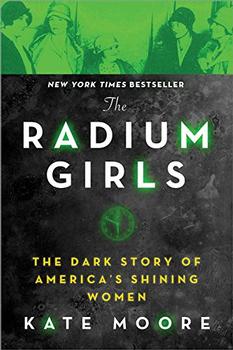Summary | Excerpt | Reading Guide | Discuss | Reviews | Beyond the Book | Readalikes | Genres & Themes | Author Bio

The Dark Story of America's Shining Women
by Kate MooreExcerpt
The Radium Girls
The girls may have been sociable, but they still had a job to do, and if they didn’t knuckle down and do it, they were out. It could be tough. As Katherine Schaub had observed in Newark, the girls were under a lot of pressure. If a worker failed to keep up, she was criticized; if she fell short repeatedly, she eventually lost her job. The only time the girls really saw Mr. Savoy, whose office was downstairs, was when he came to scold them.
The biggest issue was the wasting of the paint. Each day, Miss Rooney issued a set amount of powder to the girls for completing a particular number of dials—and they had to make it last. They could not ask for more, but neither could they eke it out; if the numerals were not sufficiently covered by the material, it would show up during inspection. The girls took to helping each other out, sharing material if one found she had a little extra left over. And there were also their water dishes, filled with the radium sediment. Those, too, could be a source of extra material.
But the cloudy water hadn’t gone unnoticed by the company bosses. Before too long, the crucibles for cleaning the brushes were removed with the explanation that too much valuable material was wasted in the water. Now the girls had no choice but to lip-point, as there was no other way to clean off the radium that hardened on the brush. As Edna Bolz observed, “Without so doing it would have been impossible to have done much work.”
The girls themselves were also targeted in the drive to limit waste. When a shift was over and they were about to leave for home, they were summoned to the darkroom to be brushed off: the “sparkling particles” were then swept from the floor into a dustpan for use the next day.
But no amount of brushing could get rid of all the dust. The girls were covered in it: their “hands, arms, necks, the dresses, the underclothes, even the corsets of the dial-painters were luminous.” Edna Bolz remembered that even after the brushing down, “When I would go home at night, my clothing would shine in the dark.” She added, “You could see where I was—my hair, my face.” The girls shone “like the watches did in the darkroom,” as though they themselves were timepieces, counting down the seconds as they passed. They glowed like ghosts as they walked home through the streets of Orange.
They were unmissable. Unassailable. The residents of the town noticed not just the wraithlike shine but also the expensive, glamorous clothes, for the girls dressed in silks and furs, “more like matinee idlers than factory workers,” a perk of their high wages.
Despite the attractions of the job, however, it wasn’t for everyone. Some found the paint made them sick; one woman got sores on her mouth after just a month of working there. Though the girls all lip-pointed, they did so at different intervals, which perhaps accounted for the varying reactions. Grace Fryer found that “I could do about two numbers before the brush dried,” whereas Edna Bolz lip-pointed on every number, sometimes even two or three times per number. Quinta Maggia did the same, even though she hated the taste: “I remember chewing [the paint]—gritty—it got between my teeth. I remember it distinctly.”
Katherine Schaub was one of the more infrequent pointers; only four or five times per watch would she slip the brush between her lips. Nonetheless, when she suddenly broke out in pimples—which could have been due to her hormones, for she was still only fifteen—she was perhaps mindful of some of her colleagues’ adverse reactions, as she decided to consult a doctor.
To her concern, he asked her if she worked with phosphorus. This was a well-known industrial poison in Newark, and it was a logical suspicion—but it made Katherine feel anything but logical and calm. For it wasn’t only her acne that caused the doctor concern: there were changes, he noted, in Katherine’s blood. Was she sure she didn’t work with phosphorus?
Excerpted from The Radium Girls by Kate Moore. Copyright © 2017 by Kate Moore. Excerpted by permission of Sourcebooks. All rights reserved. No part of this excerpt may be reproduced or reprinted without permission in writing from the publisher.




The longest journey of any person is the journey inward
Click Here to find out who said this, as well as discovering other famous literary quotes!
Your guide toexceptional books
BookBrowse seeks out and recommends the best in contemporary fiction and nonfiction—books that not only engage and entertain but also deepen our understanding of ourselves and the world around us.